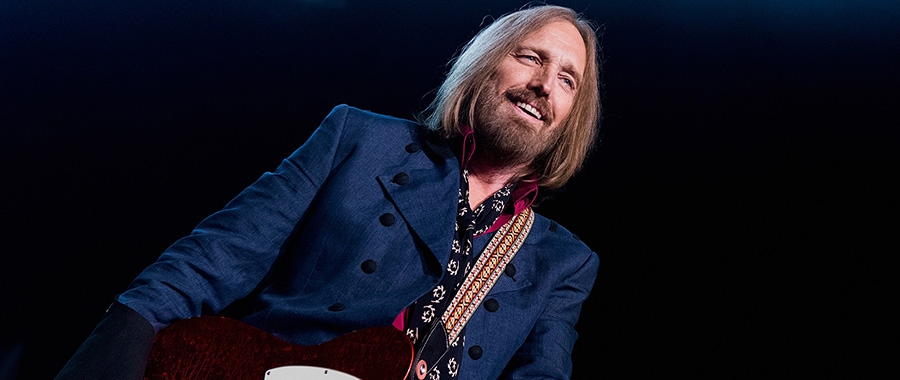The views expressed in our content reflect individual perspectives and do not represent the authoritative views of the Baha'i Faith.
The opening guitar chords of Tom Petty’s “Free Falling” created a sunburst in my heart when I first heard them during my junior year of high school.
Twenty-seven years later, his death marked the passing of a musical icon of my generation.
Although the late singer might not have envisioned it this way, his songs carry overtones of Baha’i perspectives: about the uplifting value of music, the existence of forces beyond this world, the powerful presence of justice, and the importance of, and the inspiration that comes from, upholding strong beliefs in the face of adversity.
The Divine Art of Music
Petty’s music was joyous, uplifting, and meaningful to me–and, I suspect, millions of others. Abdu’l-Baha’s statement about music reflects these feelings:
The art of music is divine and effective. It is the food of the soul and spirit. Through the power and charm of music the spirit of man is uplifted. – Abdu’l-Baha, The Promulgation of Universal Peace, p. 56.
As long as I can remember, Petty was a mainstay of American culture. In the eighties, Tom Petty and the Heartbreakers captured the country’s attention with “Refugee.” A few years later, he teamed up with legends Bob Dylan, George Harrison, Jeff Lynne, and Roy Orbison to form the supergroup “Traveling Wilburys,” creators of songs such as “Handle Me with Care,” “End of the Line,” and “Margarita.” This was one of the first albums I ever purchased.
When Petty released his 1989 album “Full Moon Fever,” including the songs “Free Falling,” “Learning to Fly,” and “Running Down a Dream,” it rocketed up the charts. Petty’s 1994 “Wildflowers” has been dear to me over the years. On “Wake Up Time,” Petty assures the listeners, in his gentle, deep, slightly nasally voice, “Yeah you’ll be all right. It’s just gonna take time.” The 1996 ballad “Angel Dream” captivated me, and “Flirting with Time,” from the 2006 album “Highway Companion” tickles and nudges at my soul and instincts as I drift into middle age and become more aware of my spiritual reality.
Not Backing Down
Petty’s monster hit “I Won’t Back Down” topped the rock charts for five weeks. The lyrics speak of a force beyond this world: absolute integrity, and outright refusal to back down in the face of injustice.
Petty wrote the song after a horrendous 1987 arson attack destroyed his house. When he and his family survived, Petty, addressing his would-be murderer, penned the words:
Well, I won’t back down
No, I won’t back down
You can stand me up at the gates of hell
But I won’t back down
No, I’ll stand my ground, won’t be turned around
And I’ll keep this world from draggin’ me down
Gonna stand my ground and I won’t back down
Hey baby, there ain’t no easy way out
Hey, I will stand my ground and I won’t back down
Well, I know what’s right, I got just one life
In a world that keeps on pushin’ me around
But I’ll stand my ground and I won’t back down
Hey baby, there ain’t no easy way out
Hey, I will stand my ground
And I won’t back down
Petty’s lyrics parallel Biblical and Baha’i writings, filled with discussions of justice and spiritual forces:
And the Lord said, “If you had faith like a grain of mustard seed, you could say to this mulberry tree, ‘Be uprooted and planted in the sea,’ and it would obey you.” – Luke 17:6.
Be vigilant, that ye may not do injustice to anyone, be it to the extent of a grain of mustard seed. Tread ye the path of justice, for this, verily, is the straight path. – Baha’u’llah, Gleanings from the Writings of Baha’u’llah, p. 250.
“Keep this World from Draggin’ Me Down”
Baha’i history–and the situation of modern Baha’is in Iran and other places–is also reminiscent of Petty’s anthem. In the Baha’i community, it is not unusual to meet Persian and other Baha’is whose families have experienced terrible persecution because of their religion, including imprisonment, denial of education, and murder for their beliefs—and yet who refused to back down under tremendous pressure to recant their Faith.
During the early years of the Babi Faith, the predecessor religion to the Baha’i Faith, some 20,000 Babis were martyred for their beliefs as they refused to renounce their newfound beliefs. Tahirih, who, at an 1848 conference at Badasht ripped off her veil to the shock of many present, was among the most prominent Babis. She was executed in 1852 for her faith. At her death, she defied her executioners, stating that, although she could be killed, they could not stop the emancipation of women.
These are only a few examples–the history of the Faith is replete with such episodes of Baha’is who essentially declare: “Gonna stand my ground, and not back down” as a response to gross injustice. Sadly, such oppression carries on today. Baha’is in Iran are denied the right to an education (#notacrime). Baha’i Holy sites in Iran, such as the Houses of the Bab and Baha’u’llah’s father, and cemeteries, have been systematically desecrated and destroyed–actions which erase not only religious, but cultural history. Baha’is are routinely imprisoned, not for committing any crime, but for what they believe.
Looking Ahead
At the end of his last concert at the Hollywood Bowl in Los Angeles on September 25, only a week before he died, Petty eerily told the crowd, “We love you dearly. I want to thank you for 40 years of a really great time. We’re almost out of time …”
When you run out of time, as everyone ultimately does, will you be able to say you didn’t back down?
















Comments
Sign in or create an account
Continue with Googleor